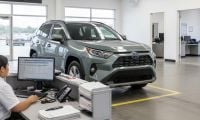According to an analysis by RVI Analytics of Stamford, Conn., new vehicle prices increased for the first time in 8 months, and remain up compared to last year’s prices. New vehicle prices (transaction prices), on a seasonally adjusted basis, are up 0.61% from January to February. New vehicle prices have increased 3.0% since February 2011.
The reason for the jump is fairly simple. Consumers are expressing a pent-up demand and buying new vehicles. Auto manufacturers no longer have to bargain hard to get consumers through the door. Incentives are dropping.
Hyundai has reached some of the lowest incentive levels. As Hyundai Motor America president and CEO John Krafcik rightly bragged at the New York International Auto Show media days, Hyundai's incentives averaged $843 per vehicle, which is one-third the industry average. That number is also dropping.
Industry sales were up in March. According to most figures, the increase was about 13.3 percent. Chrysler all but obliterated that mark, though, with sales up 69.7 percent in March.
There is one troubling fact on the horizon. It doesn't so much affect OEMs as it spells bad news for consumers. According to an article in SubPrimeNews.com, the market penetration of long-term financing deals reached a record level last month. According to J.D. Power research, more than 30 percent of retail sales in March included 72-month (or longer) loan terms. The 72-plus-month financing penetration rate observed in March was up from 28.3 percent in February and 24.6 percent in March 2011.
That's a sign that consumers with weaker credit are coming back into the market, according to J.D. Power. Because of higher interest rates, they sometimes have to get longer loans in order to have lower monthly payments.
It's also a sign of something else that is troubling: consumers are starting to buy more car than they can afford. They get sold on a monthly payment more than how much they are actually spending.
The major problem is the amount of time it takes to get right-side up on a long loan. Consumers will grow long bored with their vehicles but still have years left to pay.
That also potentially hurts the used car market because consumers are forced to hold onto their new cars longer. That weakens supply to the used car lots.
Sales are going to continue to do well for the manufacturers in 2013. Just keep an eye on how consumers fare. It's not going to be good news that trickles down.
Set as google preferred source











